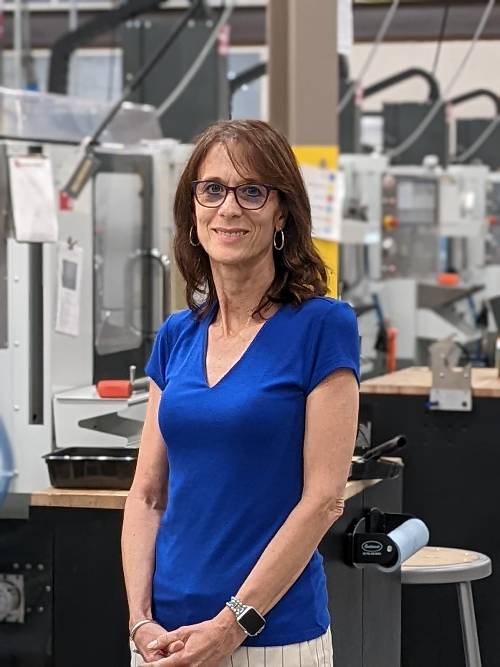Bargebuhr spreads word about value of apprenticeships in today's workplace
Published on: June 8, 2022

Laurie Bargebuhr came to the Piedmont Triad straight out of college to help her father with his business. Thirty years later, she's still here, only now she is helping other folks with their businesses.
Bargebuhr is the apprenticeship coordinator for Guilford Technical Community College, and at a time when business is exploding in the Triad, outstripping the available workforce, it is a job of vast importance. That is not lost on Bargebuhr.
"When Boom Supersonic made their announcement, in that initial announcement, they said they would have 200 apprenticeships open to anyone in colleges in North Carolina. That's a pretty strong endorsement of apprenticeships," Bargebuhr said, referring to Boom Supersonic's plan to open a production plant for aircraft in Greensboro. "That puts pressure on the entire area. Apprenticeships are employer driven. There are none unless there is a need."
And the need is obviously bigger than ever in the Triad. GTCC presently has 144 apprentices in its program. It's Bargebuhr's job to keep that number growing.
She loves the challenge. She embraces the experience of apprenticeship. It's hard to believe it's something fairly new to her.
When she came south from Long Island in 1985 to assist her father as he moved his manufacturing business to the area, Bargebuhr probably didn't figure it would become her forever home. She worked for her dad's company, which manufactured industrial food process equipment even after it was sold in 2013. By 2018, it was time for a change.
Bargebuhr decided to check out GTCC. Perhaps, she thought, they would have an opening that interested her. It turned out to be a perfect fit that morphed into a second career.
First, she worked in the college's business and industry department. "I had been in sales before. I enjoyed talking to people about their business and helping solve their problems."
Then the college began a search for an apprenticeship coordinator.
"I had always kept my ears open about apprenticeships because I had been contacted when the GAP (Guilford Apprenticeship Partners) program began. I thought it sounded great, but we were a small company, and we just didn't have the time and resources to put into it.
"When the opportunity came up to apply for this position, I did. It was an opportunity to work with students and companies in solving labor problems. We need everyone's talents. This was something I thought was a great program."
In a nutshell, Bargebuhr is a liaison between companies setting up apprenticeships and the students.
"I explain how apprenticeship programs work. We look at the job description they want to design the program for and then recommend the related education that aligns with the job. It could be an associate degree or a one-year program or a certificate program."
After experiencing labor shortages in her family's manufacturing company and then witnessing critical worker deficiencies in general over the past couple of years, Bargebuhr understands the importance and value of apprenticeships better than many. She speaks adeptly and passionately about apprenticeships.
"You can learn about quality control in a classroom and that's fine. But the big difference of going to a company and seeing how it works and the ramifications of it, particularly in food production or flight critical parts, is that you see real consequences."
The description of an apprenticeship, Bargebuhr says, is fairly simple, "There are always certain things. There is an employer involved. There is related instruction that could be at a community college or any number of places, and then there is on-the-job training. There is also a wage scale and a journey-worker credential."
Bargebuhr has noticed a more favorable understanding of apprenticeships by the public and, more specifically, by employers over the past few years.
"Apprenticeship is not such an unusual word anymore. It's been normalized. People have heard more about it. There is more acceptance of people not taking the four-year plan to education," Bargebuhr said. "I think people are really starting to understand that learning and doing at the same time is really valuable. I try to tell everyone one of the values is the immediate relevancy of it. You learn things in the classroom and then go to work and see it play out in real time."
Bargebuhr is a big believer that apprenticeships do more than build good employees. She says apprenticeships also help students lean into their real-world potential.
"The students are great. I tell people all the time who are disparaging millennials and Gen Zs that they are meeting all the wrong ones. There are a lot of great students doing great things," she said. "They have a lot of responsibility at their jobs and are an important part of their jobs. They enjoy it and rise to the occasion."
Back to All Articles